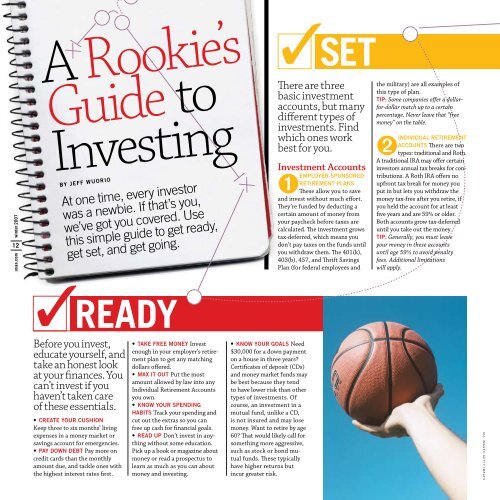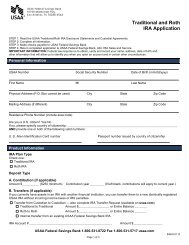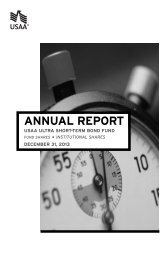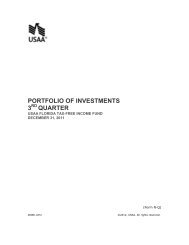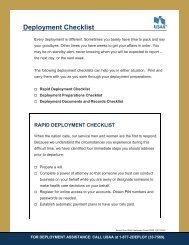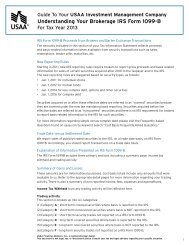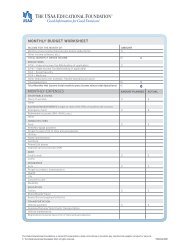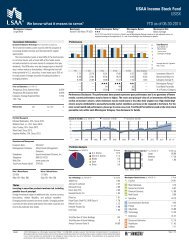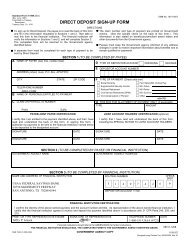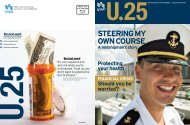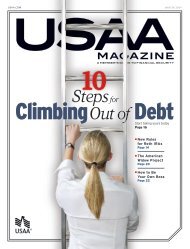You also want an ePaper? Increase the reach of your titles
YUMPU automatically turns print PDFs into web optimized ePapers that Google loves.
winter <strong>2007</strong><br />
12<br />
usaa.<strong>com</strong><br />
A Rookie’s<br />
Guide to<br />
Investing<br />
By Jeff Wuorio<br />
At one time, every investor<br />
was a newbie. If that’s you,<br />
we’ve got you covered. Use<br />
this simple guide to get ready,<br />
get set, and get going.<br />
Ready<br />
set<br />
There are three<br />
basic investment<br />
accounts, but many<br />
different types of<br />
investments. Find<br />
which ones work<br />
best for you.<br />
Investment Accounts<br />
➊employer-sponsored<br />
retirement plans<br />
These allow you to save<br />
and invest without much effort.<br />
They’re funded by deducting a<br />
certain amount of money from<br />
your paycheck before taxes are<br />
calculated. The investment grows<br />
tax-deferred, which means you<br />
don’t pay taxes on the funds until<br />
you withdraw them. The 401(k),<br />
403(b), 457, and Thrift Savings<br />
Plan (for federal employees and<br />
the military) are all examples of<br />
this type of plan.<br />
TIP: Some <strong>com</strong>panies offer a dollarfor-dollar<br />
match up to a certain<br />
percentage. Never leave that “free<br />
money” on the table.<br />
➋individual retirement<br />
accounts There are two<br />
types: traditional and Roth.<br />
A traditional IRA may offer certain<br />
investors annual tax breaks for contributions.<br />
A Roth IRA offers no<br />
upfront tax break for money you<br />
put in but lets you withdraw the<br />
money tax-free after you retire, if<br />
you held the account for at least<br />
five years and are 59½ or older.<br />
Both accounts grow tax-deferred<br />
until you take out the money.<br />
TIP: Generally, you must leave<br />
your money in these accounts<br />
until age 59½ to avoid penalty<br />
fees. Additional limitations<br />
will apply.<br />
Before you invest,<br />
educate yourself, and<br />
take an honest look<br />
at your finances. You<br />
can’t invest if you<br />
haven’t taken care<br />
of these essentials.<br />
• create your cushion<br />
Keep three to six months’ living<br />
expenses in a money market or<br />
savings account for emergencies.<br />
• pay down debt Pay more on<br />
credit cards than the monthly<br />
amount due, and tackle ones with<br />
the highest interest rates first.<br />
• take free money Invest<br />
enough in your employer’s retirement<br />
plan to get any matching<br />
dollars offered.<br />
• max it out Put the most<br />
amount allowed by law into any<br />
Individual Retirement Accounts<br />
you own.<br />
• know your spending<br />
habits Track your spending and<br />
cut out the extras so you can<br />
free up cash for financial goals.<br />
• read up Don’t invest in anything<br />
without some education.<br />
Pick up a book or magazine about<br />
money or read a prospectus to<br />
learn as much as you can about<br />
money and investing.<br />
• know your goals Need<br />
$30,000 for a down payment<br />
on a house in three years<br />
Certificates of deposit (CDs)<br />
and money market funds may<br />
be best because they tend<br />
to have lower risk than other<br />
types of investments. Of<br />
course, an investment in a<br />
mutual fund, unlike a CD,<br />
is not insured and may lose<br />
money. Want to retire by age<br />
60 That would likely call for<br />
something more aggressive,<br />
such as stock or bond mutual<br />
funds. These typically<br />
have higher returns but<br />
incur greater risk.<br />
A l l i m a g e s : g e t t y i m a g e s


